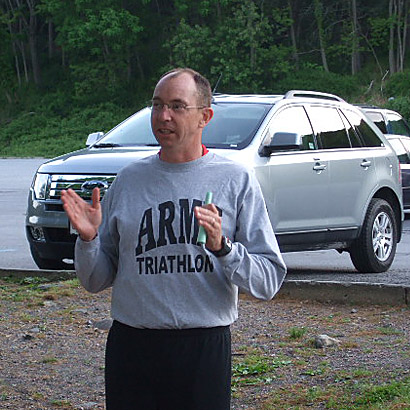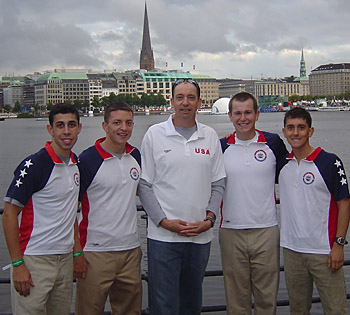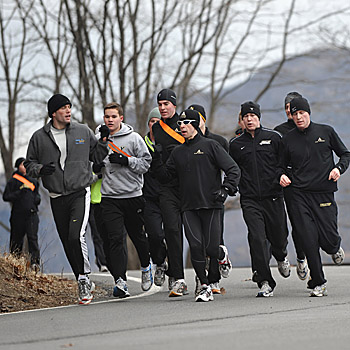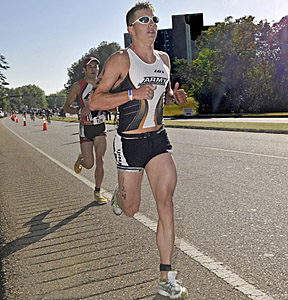West Point Triathlon Part 2: The Colonel who sparked the rise

There is a lot of excitement and anticipation with the West Point Triathlon team as they aim at the 2009 USA Triathlon Collegiate Nationals. Top US Military Academy triathletes Nicholas Vandam and Ashley Morgan have hopes for podiums or possibly even overall wins for a title that has swiftly grown in popularity, participation and prestige. The men’s team finished third in 2007, second last year and is coming in with a lot of momentum and hope to join their military peers, the 2007 Navy men’s and women’s squads, as a national collegiate team champion.
But before looking at the some of the top Army triathletes on this quest, the place to start is with the volunteer adviser who gave the Army Triathlon team the vision, the training road map and a team structure that put this dream within reach.
Army Colonel Pat Sullivan isn’t a West Point grad, isn’t an elite triathlete, and he isn’t a coach with academic credentials and a glittering competitive resume like Tony DeBoom or even ace swim technique coach Lou Tharp. Nor is he a quite the dashing Infantry officer who served with innovation and bravery in hellish street battles in Operation Iraqi Freedom like Major Todd Brown, a top age group triathlete and an elite age grouper who serves as a mentor for members of the Army Triathlon team.
But, as virtually any member of today’s West Point triathlon team will tell you, this level of recent success could not have happened without Colonel Sullivan’s initiative and love for the sport. “When Colonel Sullivan came to West Point in 2006, he brought knowledge, motivation and a winning spirit,” said 2009 Triathlon Captain Nicholas Vandam. “He is a good triathlete and had been doing the sport for 15 years. He came in saying ‘We are going to win’ and he motivated people to rise to the next level.”
After a stint in Iraq as a brigade commander for strategic logistics, Colonel Sullivan came to West Point to serve as staff officer at the Simon Center for Professional Military Ethics. He came at a propitious time for the triathlon team, a time current coach Tony DeBoom calls “a perfect storm” in which several excellent Army NCAA Division I athletes were looking for a different team atmosphere — combined with a better opportunity to satisfy their competitive hunger. Vandam, a Division I athlete who felt he was growing stale with swimming, said “I was thinking about what I was going to do with triathlon and whether I would come back to swimming the next year. Meeting Colonel Sullivan was a comfort. I thought ‘Wow. This guy knows what he is talking about. I wanted to be trained, I wanted to learn how to race and improve myself as a triathlete. When I saw he was a real coach with a plan that worked, I decided ‘Hey I’m on board! I’m into triathlon.’”
Nick Dason, another Army Division 1 swimmer who had just returned to the Academy for his senior year after serving a tour in Iraq, felt the same way after a January 2007 meeting. “I had no swim or run background, but ended up trying out for the triathlon team after meeting Colonel Sullivan, who had a major influence in raising expectations of performance on the triathlon team,” said Dason, who rose quickly into the 2007-2008 captain’s role.
Another key in attracting the ambitious, talented athletes was the spirit of the triathlon team. “I loved swimming and I still do,” said Vandam. “But the team was so serious all the time, it was not fun. I felt like an automaton. The triathlon team was different. We worked hard and aimed at winning, but there is a great camaraderie, a spirit of mutual trust and commitment. We have fun at practice, at the races and spend a lot of free time together. A lot of that came from Colonel Sullivan’s approach.”
Pat Sullivan joined the Army in 1985 after receiving a finance degree from Eastern Kentucky University. At that point, he had done some running and road racing. “Then I decided I was interested in triathlon because it matches the Army lifestyle of staying fit,” he said. “I tried a triathlon at Furman College in Greensboro, South Carolina, and I was hooked because of the personal challenge, not so much for the competition. The sport was just getting started and so was I – I did not know how to ride a bike nor how to swim with any proficiency. I appreciated being apart of it.”
Since then, he has done about 100 triathlons on four continents during the usual peripatetic Army career. But perhaps the most important element of Colonel Sullivan’s triathlon education came during a deployment to Australia in 1993-1995. “When I served in Australia, I had an opportunity to train with Team Panthers, a club of approximately 300 triathlete based just outside Sydney. It was incredible how they fostered the sport. There I trained with a group. I swam with a group, I biked and ran with a group and we had coaches for all of it. UI found I needed a group. They helped firm up my love for the sport, and I became a much better triathlete than I ever expected.”
During his time in Oz, Sullivan did 52 triathlons, everything from short Formula One style sprints to Ironman Australia. When then-Captain Sullivan returned to the States in 1995, he decided to try to qualify for the military nationals the next year. “The key was finding a coach with an organized plan,” he said. “A friend of mine recommended Jim Bruskewitz (a multiple age group national and world champion from Wisconsin),” said Sullivan. So from February through August of 2006, Bruskewitz put Sullivan on a disciplined regimen. “He taught me how to periodize my training, to divide it into micros and macros. He taught me all this stuff and for the first time, I learned how to train in an analytic, appropriate way. And at the end, I ran faster than I ever had in my life.”

For the next decade, Sullivan had continued success with that triathlon training regimen. When he arrived at West Point in the summer of 2006, he wanted to share what he’d learned with the triathlon team. “I thought, why not take the structure and foundation of training principles I had learned from Jim Bruskewitz and throw in the social aspect I’d found in Australia? It was a natural. I just wanted them to prepare as I’d been prepared. I just took what I’d learned and when I got to West Point, I had a passion for it and I knew what to do.”
About the time Colonel Sullivan arrived, Army NCAA swimmers Vandam, Dason and Kari Vahle came on board, as did soccer midfielder Randy Wintermantel, cross country and track star Ashley Morgan, and top high school runners Brian Lagasse, Rob Sherry and Nicholas Sterghos. In 2007, the men’s team advanced from 14th to 3rd overall, while the women improved from 19th to 9th.
“The triathlon team functioned very much like my Australian club, and offered a great example of the best military leadership dynamic,” said Sullivan. “While the sport is individual in nature, working together they appreciate that everyone is attempting to do to perform at their best. Kids see who’s doing well and who’s not doing well. Leaders emerge to counsel their teammates to pick up the pace and let them know their potential is much greater than they are putting out. So the team serves a dual purpose. It makes them all better at their sport, and they are learning how to overcome obstacles and become better leaders.”
A career Army man, Sullivan also knew he had to find mentors and leaders to carry on after he was gone. “I knew that with Dason and Vandam and Ashley Morgan and all the other excellent triathletes who had come on board, there was only so far I could take them,” he said. “I could not take them to become elite triathletes. So just before the 2007 USA Triathlon Collegiate Nationals, I contacted a lot of old grads to see if they had time to reinvest in the team. Tony DeBoom agreed to talk to the team before that race. And by the summer, he agreed to become the coach for the 2008-2009 season.”
Sullivan says that DeBoom, who had just started a coaching business, “brings a level of experience and a style of leadership which is exactly what the cadets need. He is a West Point graduate and served as an Army Ranger, so there are not many other folks who completely understand the cadets’ tough regimen and schedule and the stress of life in the corps. Plus, with his professional success, he understands the sport about as well as anyone out there today.”
The support that officers offer the cadets on West Point triathlon team is typical of the Army method to volunteer and mentor together to build team strength. Colonel Ralph Vargas, another avid age group triathlete (right now fighting a long term injury which has put him out of triathlon action) serves several crucial roles; including monitoring the cadets' academic progress to make sure they stay eligible. Vargas also helps the cadets develop a yearly budget working with the cadet activities fund, soliciting graduate donations, and organizing the cadet run West Point Triathlon in late summer. In addition, Vargas, and Majors Todd Brown and Andy Caine offer perspective how triathlon can prepare cadets from the challenge of military leadership.
So, too, does Colonel Sullivan, who is served as the equivalent of a visiting scholar on military ethics at West Point since 2006. “The link between their sport and their duty is strong on many fronts,” said Colonel Sullivan. “The core values of the Army include a few fundamental things: ‘I will never quit.’ That creates athletes and soldiers with tremendous perseverance. ‘I will never leave a fallen comrade.’ They always stop for a buddy injured in battle, and do the same for a teammate who’s crashed or injured by the side of the road. ‘I will never accept defeat.’ That carries a multitude of meanings. If you have a bad day, or your bike breaks down, you will do what you have to finish and walk across the finish line rather than pull out. Looking at the big picture, patience is required. You understand that you do not expect success without putting in hard work and regular training. And in the military, we work hard, and are educated to live up to be what we say we want to be. So a lot of what we do in triathlon is simple to translate from triathlon present to military future. All of it translates to what we do in combat situations.”



